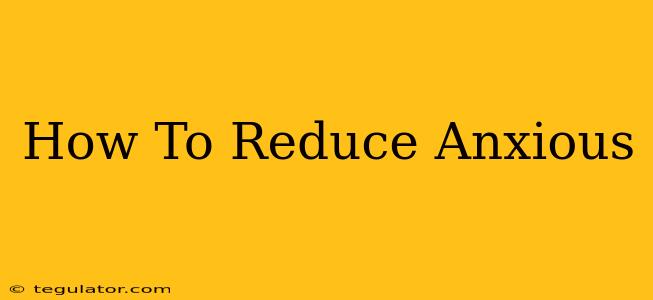Anxiety. That persistent feeling of unease, worry, and nervousness that can disrupt our daily lives. It's a common experience, but that doesn't make it any less challenging. Fortunately, there are many effective strategies you can use to manage and reduce anxiety. This guide will explore practical techniques to help you regain control and live a calmer, more fulfilling life.
Understanding Your Anxiety
Before diving into solutions, it's crucial to understand the nature of your anxiety. Is it situational (triggered by specific events), generalized (constant low-level worry), or something more complex requiring professional help? Identifying the root cause can inform your approach. Keeping a journal to track triggers, symptoms, and your emotional responses can be incredibly insightful.
Recognizing the Signs
Anxiety manifests differently in each individual. Common symptoms include:
- Physical: Racing heart, shortness of breath, sweating, trembling, muscle tension, headaches, stomach problems.
- Emotional: Feeling overwhelmed, irritable, restless, on edge, difficulty concentrating, feeling constantly worried.
- Behavioral: Avoiding situations that trigger anxiety, excessive worrying, procrastination, difficulty sleeping.
If you're experiencing severe or persistent anxiety, seeking professional help is vital. A therapist or counselor can provide a personalized diagnosis and treatment plan.
Practical Techniques to Reduce Anxiety
Now, let's explore some practical strategies you can implement to manage your anxiety:
1. Mindfulness and Meditation
Mindfulness involves paying attention to the present moment without judgment. Regular meditation practices can significantly reduce anxiety by calming the mind and fostering self-awareness. Even a few minutes a day can make a difference. There are many guided meditations available online or through apps.
2. Deep Breathing Exercises
Deep, slow breathing activates the parasympathetic nervous system, which helps to calm the body's stress response. Simple techniques like diaphragmatic breathing (belly breathing) can be incredibly effective in managing anxiety symptoms in the moment.
3. Exercise Regularly
Physical activity is a powerful stress reliever. Exercise releases endorphins, which have mood-boosting effects. Find an activity you enjoy, whether it's running, swimming, yoga, or dancing, and aim for at least 30 minutes of moderate-intensity exercise most days of the week.
4. Improve Your Sleep Hygiene
Sleep deprivation exacerbates anxiety. Prioritize getting 7-9 hours of quality sleep each night. Establish a relaxing bedtime routine, create a sleep-conducive environment, and avoid caffeine and alcohol before bed.
5. Healthy Diet and Nutrition
Nourishing your body with a balanced diet can significantly impact your mental well-being. Focus on whole foods, limit processed foods, sugar, and caffeine, and stay hydrated.
6. Cognitive Behavioral Therapy (CBT) Techniques
CBT is a type of therapy that helps you identify and challenge negative thought patterns and behaviors that contribute to anxiety. Techniques like cognitive restructuring and exposure therapy can be highly effective in reducing anxiety.
When to Seek Professional Help
While these strategies can be incredibly helpful, it's crucial to remember that they are not a substitute for professional help. If your anxiety is severely impacting your daily life, interfering with your relationships, or causing significant distress, seeking professional help from a therapist or counselor is essential. They can provide a tailored treatment plan, potentially including therapy, medication, or a combination of both.
Don't hesitate to reach out for support. You're not alone, and help is available. Taking proactive steps to manage your anxiety can lead to a happier, healthier, and more fulfilling life.

